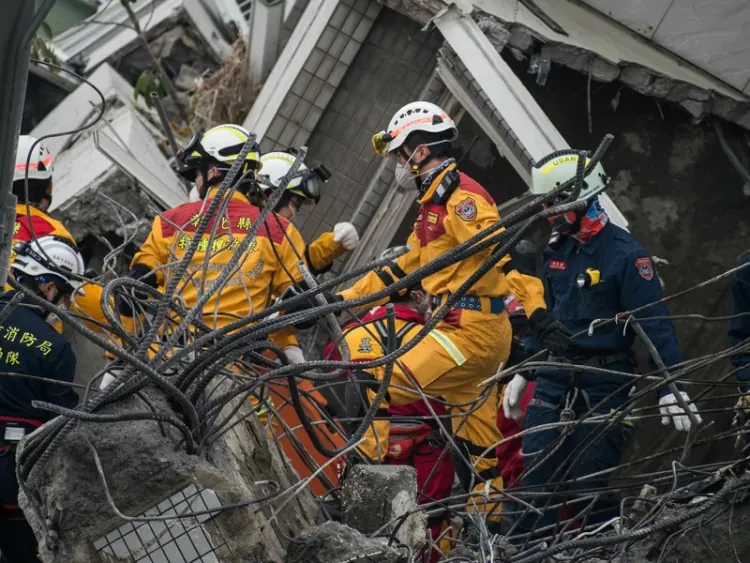Taiwan's Remarkable Earthquake Resilience
How Taiwan's effective disaster response and infrastructure upgrades led to minimal damage after a massive 7.4 earthquake in 2024

Introduction
On the morning of April 3, 2024, Taiwan was struck by a massive 7.4 magnitude earthquake, causing widespread alarm across the island. Despite the significant potential for disaster, Taiwan emerged with remarkably minimal damage and casualties, a testament to its effective disaster preparedness and resilience strategies. This article delves into the factors contributing to Taiwan's remarkable resilience, comparing it to past earthquakes and highlighting the lessons learned and applied over the years.
Outline for Comprehensive Coverage
- The Immediate Aftermath of the 7.4 Magnitude Earthquake
- Overview of the earthquake's impact
- Initial reactions and experiences of residents
- Comparing 2024 to Past Earthquakes in Taiwan
- The 1999 earthquake: A turning point in disaster response
- Advances in building codes and infrastructure resilience
- Strategies for Earthquake Resilience
- Retrofitting and reinforcing infrastructure
- The role of earthquake alert systems and drills
- Learning from Each Quake: Taiwan's Continuous Improvement
- Case studies of infrastructure successes and failures
- Public and governmental responses to quake experiences
- Taiwan's Earthquake Preparedness: A Global Model
- International recognition of Taiwan's disaster preparedness
- Lessons for other earthquake-prone regions
The Immediate Aftermath of the 7.4 Magnitude Earthquake
The earthquake that hit Taiwan on April 3, 2024, sent shockwaves throughout the island, leading to swaying bridges and landslides. However, the rapid response from authorities and the community's resilience led to a quick recovery, with services like train transportation being restored within 24 hours. The casualties were significantly lower than expected, with nine fatalities and over a thousand injuries reported, showcasing the effectiveness of Taiwan's disaster preparedness measures.
Comparing 2024 to Past Earthquakes in Taiwan
The 1999 earthquake in Taiwan was a devastating event that prompted a major overhaul in the country's approach to disaster preparedness. This tragic event, which resulted in over 2,000 deaths, highlighted the need for stringent building codes and quality materials. The lessons learned from 1999 paved the way for the advancements that contributed to the minimal impact of the 2024 earthquake.
Strategies for Earthquake Resilience
Following the 1999 catastrophe, Taiwan embarked on a comprehensive campaign to retrofit existing infrastructure and enforce strict building codes designed to withstand seismic events. The introduction of an earthquake alert system, although it experienced malfunctions, represents a critical component of Taiwan's resilience strategy. Regular public drills and educational campaigns have also played a key role in preparing the populace for earthquake scenarios.
Learning from Each Quake: Taiwan's Continuous Improvement
Each earthquake in Taiwan serves as a learning opportunity, enabling continuous improvement in both infrastructure and response strategies. The post-quake analyses have led to the implementation of more robust building designs and the retrofitting of vulnerable structures, including schools and public buildings. These measures have significantly enhanced Taiwan's resilience to earthquakes.
Taiwan's Earthquake Preparedness: A Global Model
Taiwan's approach to earthquake preparedness and disaster response has garnered international attention, serving as a model for other earthquake-prone regions. The country's proactive measures and continuous improvement ethos demonstrate the importance of learning from past experiences to mitigate the impact of future earthquakes.
FAQs
Q: How did Taiwan manage to minimize the impact of the 2024 earthquake? A: Through stringent building codes, infrastructure retrofitting, effective alert systems, and public preparedness drills.
Q: What lessons were learned from the 1999 earthquake in Taiwan? A: The necessity of enforcing building codes, using quality construction materials, and engaging in comprehensive disaster preparedness planning.
Q: How does Taiwan prepare its residents for earthquakes? A: By implementing regular earthquake drills, public education campaigns, and maintaining an earthquake alert system.
Concluding Remarks
Taiwan's resilience in the face of the 2024 earthquake is a testament to the effectiveness of its disaster preparedness and response strategies. By learning from past experiences and continuously improving infrastructure and public awareness, Taiwan has set a global standard for earthquake resilience. For more insights and in-depth analysis on disaster preparedness, visit Kiksee Magazine.
What's Your Reaction?






















